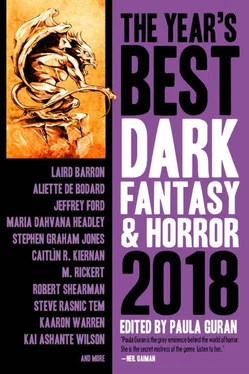I saw Edgar Allan Poe, and within him, all around him, Night. The image was of the poet, suspended in the darkness of the background, and I could see myself in ghostly silhouette behind him, my face covered in stars, my eyes glittering, my fingers laced in his own.
The poet looked at me, and reached into his jacket. He removed a pot of ink, looked at me tenderly, and opened it. I watched him, uncertain, and then, suddenly, he flung it over me.
“Thank you,” he said.
Darkness. A blotting out, a removal from view.
The Thule Daguerreotype
The original Poe portrait, taken in desolate circumstances in the year eighteen forty-eight, the year before the poet’s death, is, over the years, lost and found, discovered in the possession of a traveling hypnotist, fallen from a drawing room wall, set on fire. It lives in legend, copied and etched, discussed, tattooed, made the subject of academic texts.
After the image was taken, the subject wandered the streets, visiting the home of a woman he had proposed to, and raving that he was doomed, that he was done for good. He screamed for his soul.
The daguerreotype depicts a man in a half-buttoned black dinner jacket, a rumpled white shirt, an ascot tied and wrapped tightly enough to suggest that it is keeping his head from tumbling off. He has a high white forehead, a dark mustache, tousled hair, and eyes sunk deep in a face lined with grief. He is a year from dying, but in the Ultima Thule portrait, he appears to have emerged from his tomb, and indeed, the image depicts the poet four days after his failed suicide by laudanum.
If one looks closely, with the proper knowledge, it is possible to see the figure behind him, a spectral form, a radiance draping over one of the man’s shoulders, an image of the missing, left in dust on a silver plate. Perhaps it is a woman, or perhaps it is something else entirely.
The business of portraiture is one of silver and gold by the ton, and the miserable face of the poet is immortalized in precious metal. The presence behind him is a stain rendered in darkness, silver nitrate, an abyss that reflects light.
This is a saint’s icon, Edgar Allan Poe’s image pressed like a kiss to a ground glass windowpane, and the form holding him is a glittering ghost, mutable as frost over a view of a city at night. Does it hold him as a lover or as a captive?
What is left inside this portrait?
That is one way to look at a photo of a ghost. Another way is to look at both figures, this portrait, this imaginary kingdom and its creator flickering in and out of the light, and see it as a record of more than one event, the moment when a poet’s soul was removed, the moment when a man counted down the seconds remaining in his life.
He counts them in syllables. He counts them in sentences. He counts them in stories. All that we see or seem , he writes. Is but a dream, within a dream .
Open the glass panes that house the portrait and blow, a single breath, and the image is only imagined again. Press a finger to the face of this ghost and watch him become thin air.
The Lady’s Last Tale
I felt myself disappearing, but I remained scored into the world, my skin a page with lines on it, my hair streaked with silver, my dress still as bright as it had been, but now obliterated.
The photographer faded as I faded, and the studio as well, whether they had been there or no. An imaginary Providence or a true one, I could not say. The blue wallpaper was night, and I was part of it now, and the mercury bath was stars, and I was part of that as well.
Thule was before me then, a white landscape of cliffs and women shrouded, a body—was it my body?—washing up on a coastline made of bones. I was the sea and I was a ship, and I was a city of ghosts.
I did not disappear from the world, though it seemed I might. I stayed, and this kingdom by the sea stayed. I climbed the stairs in a tower, I in my black dress, its lining like the inside of a redbird’s wing, my magpie-feathered stripes, my bosom spattered in ink. There was a throne there, and then there was myself seated in it, reigning over the great and frozen unknown.
I ruled over a kingdom I had not made, but would not surrender, and out there, in the mist, there was no ship and there was no sinner. There was no poet with his quill, writing my world.
Here in Dream-land would I love and live forever. Here would I contain the soul of the poet, transferred to me in silver and in ink, even as I traded to him the creature I’d harbored.
I was Annabel Lenore Virginia MacFarlane, and no one would ever find me again.
Don’t Turn On The Lights
Cassandra Khaw
Stories are mongrels. It don’t matter whether they were lightning-cut into stone or whispered over the crackle of a dying flame; no story in the world has pedigree. They’ve all been told and retold so many times that not God himself could tell you which one came first. Yes, every story in creation.
Including this one.
Especially this one.
You might have heard it before. There was a girl once. Her name was Sally. It could have been any other name, really. But let’s go with Sally. It’s solid. Round-hipped and stout, the kind of Midwestern name that can walk for hours and don’t mind it much when the sun burns its skin red.
Anyway.
Sally was, maybe, about eighteen or nineteen, some freshman at a local college. And like every teenager, she sometimes got behind on her school work.
So one night, she took all her books and went down to her dormitory’s basement, telling herself she’d study till the dawn brindled the sky in gold and claret.
Halfway through, she realized she’d forgotten a book. And back up she went, feet making no sound at all on the old carpet. (Was it thick? Yes. Lush like nothing else. It had to be, or what happened next would make no sense.) Silent, she padded along until she reached her room and opened the door.
Click.
It was black inside. No lights at all. The curtains were drawn. You couldn’t see the glow of the distant town. But that was okay. Sally knew the room like the map of her palms. Slowly, she felt her way along the walls to her bed. Slowly, she realized—
There was a smell in the air: pennies and salt.
There was a sound in the air too: breathing, rasped and ragged, heavier than anything she’s heard. Sally knew the beat of her roommate’s breath. This wasn’t it.
And maybe, she might have said something if it wasn’t for the itching under her skin, something that whispered, “This isn’t all right.”
So, Sally didn’t. It was late and she was tired and it was probably just her imagination. Thus decided, she got what she needed and clicked the door shut behind her as she left, just as something began to drip, drip, drip.
“Damn faucet,” she mumbled as she swayed back down to the basement.
The next day, Sally went for her exams. How did she do? Truthfully, it didn’t plain matter. She took her examinations and then she went home, feet crunching across dried autumn leaves and cobbled stones.
Into the dormitory, she went up the spiral staircase, unease laving its way down her spine. There were far too many people out and about, their faces bright and afraid, but that wasn’t Sally’s problem, no sir. Someone else could go worry about that. All she wanted was to sleep.
Sleep wasn’t in the cards, though. Hell, I don’t know if she ever slept again. I know I wouldn’t be able to. Because when Sally finally walked all the way to her room, pushing past co-eds in their flower-printed pajamas, she found police tape and policemen.
And a smell in the air: pennies, salt, a stink of dried urine and shit.
And a sound in the air: a drip drip dripping , oozing between the noise of the walkie-talkies.
Читать дальше












